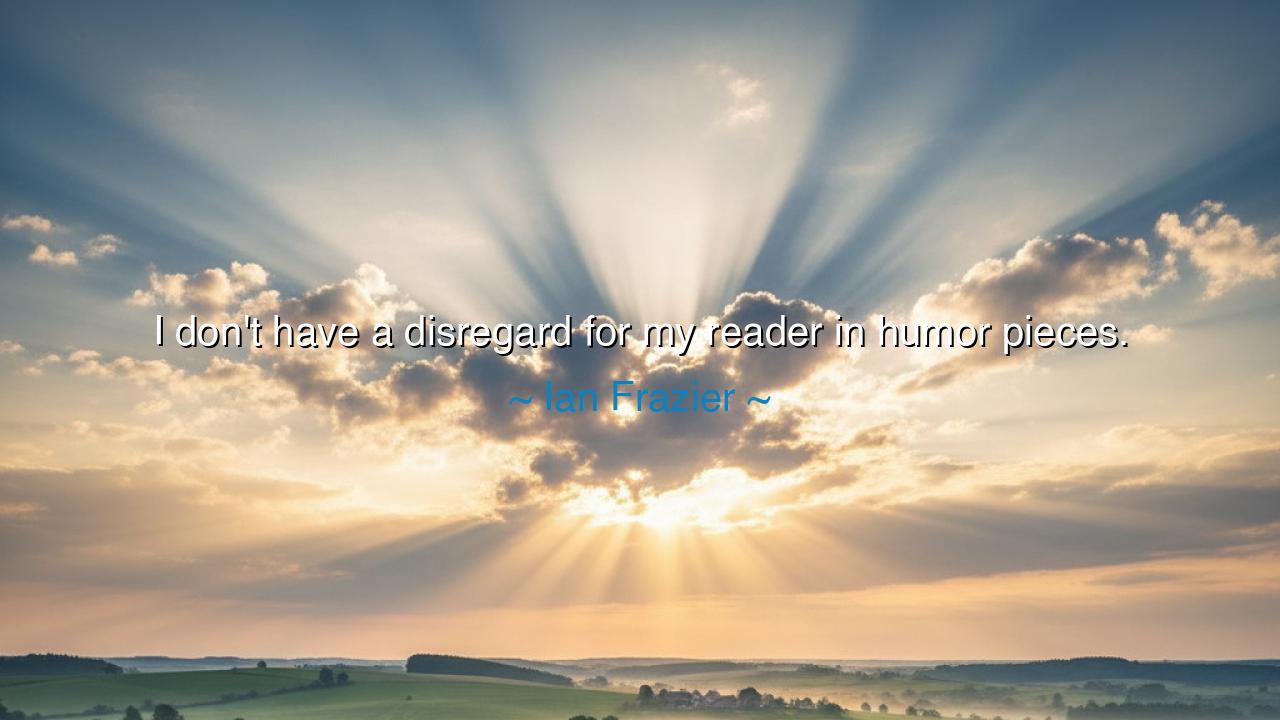
I don't have a disregard for my reader in humor pieces.






When Ian Frazier said, “I don’t have a disregard for my reader in humor pieces,” he spoke with the quiet authority of a true craftsman of words — one who honors the sacred bond between storyteller and listener. His words carry not just the humility of a writer, but the moral gravity of an artist who understands that laughter, like all beauty, carries a weight of responsibility. In this simple sentence lies an ancient truth: that the reader — the audience, the soul who listens — is not a target to be mocked, but a companion to be guided. Frazier’s humor does not wound; it invites. It does not stand above; it walks beside. It is born of respect, and that respect gives it power.
The meaning of his quote reaches deep into the heart of what it means to create. In every age, there are those who mistake cruelty for cleverness — who believe that to ridicule is to be bold, and that to offend is to be honest. But Frazier reminds us that true humor, the kind that endures, is never made at the expense of others. It arises from empathy, from the shared experience of being human. To disregard one’s reader is to break the silent covenant between artist and audience. But to regard them — to see them, to honor their intelligence, to respect their emotions — is to build a bridge that laughter may safely cross. Such humor does not mock humanity; it uplifts it.
The origin of Frazier’s words lies in his lifelong commitment to writing that blends wit with wisdom. His essays and stories, though often humorous, carry a quiet depth — the laughter of recognition rather than ridicule. He belongs to that ancient lineage of humorists who understand that comedy is not chaos, but order disguised as play. The great comedians of history — from Aristophanes in the theaters of Athens to Mark Twain on the rivers of America — shared this belief. They knew that to make others laugh is not a trivial act, but a noble one. For laughter can heal wounds that no sermon can touch, and it can unite people who might otherwise stand apart. But it can only do this when the humorist respects his audience, treating their laughter as a gift, not a conquest.
History offers us many who exemplify this sacred approach to humor. Consider Abraham Lincoln, whose dry wit softened hearts even amid the fires of civil war. When a political rival accused him of being two-faced, Lincoln replied, “If I were two-faced, would I be wearing this one?” His humor disarmed without cruelty, taught without preaching, and reminded a divided nation of its shared humanity. He never laughed at the people — he laughed with them. In this, Lincoln, like Frazier, understood that regard for the listener is the essence of noble speech. The moment a speaker or writer loses respect for the audience, their words lose their soul.
This idea echoes through the teachings of the ancients. Cicero, the Roman orator, warned that wit should “never wound the spirit of the hearer.” For laughter that humiliates destroys trust; it turns connection into conflict. The writer, like the philosopher, must therefore wield humor as a blade of light, sharp enough to reveal truth but gentle enough not to scar. Frazier’s humor carries that same wisdom — it is intelligent without arrogance, funny without cruelty, and aware of the humanity that binds writer to reader. It reminds us that humor is a moral act, and that the measure of great wit lies not in how hard it strikes, but in how deeply it resonates.
In the world of today, where mockery too often masquerades as intellect and outrage passes for art, Frazier’s words are a call to reverence. They remind us that laughter should not come from cruelty, but from compassion; not from derision, but from discovery. To “have a disregard for the reader” is to forget that every word we write or speak enters the sacred space of another’s mind. To honor that space is to treat the reader not as a customer, but as a fellow traveler on the road to understanding. The writer who does this transforms humor into harmony — a meeting of minds where truth and laughter walk hand in hand.
So, my listener, take this wisdom to heart: respect your audience in all that you create. Whether you write, speak, teach, or joke, remember that those who receive your words are not strangers, but reflections of yourself. Before you speak, ask: Does this uplift or diminish? Does this unite or divide? Let your humor be born not from contempt, but from love — the kind of love that sees folly in all mankind, including yourself. For the laughter that comes from humility lasts longer than the laughter that comes from cruelty.
In the end, Ian Frazier’s words are not merely about writing — they are about life itself. Every act of communication, every shared moment of laughter, is an opportunity to build connection. Regard your listener. Honor your reader. Let your humor carry the weight of kindness and the light of truth. For humor without regard is noise, but humor with empathy is music — and that music, once heard, echoes across generations.






AAdministratorAdministrator
Welcome, honored guests. Please leave a comment, we will respond soon